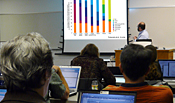You are here
CMOP Hosts Third Geoscience Alliance National Conference

Sponsored by the Center for Coastal Margin Observation & Prediction (CMOP), the third Geoscience Alliance national meeting, “GA3: A Changing Climate’s Effect on Rivers, Estuaries, Oceans, First Foods, and Tribal Health,” met in Portland, Oregon, March 21-23, 2015. 48 different indigenous nations were represented at the conference.
The Geoscience Alliance (GA) is a national alliance of individuals committed to broadening participation of Native Americans in the geosciences. Its members are faculty and staff from tribal colleges, universities, and research centers; native elders and community members; industry and corporate representatives; students; formal and informal educators; and others.
Native Americans are underrepresented in the Geosciences, despite ongoing efforts to provide pathways into geoscience careers for Native students. With Native participation, a geoscience research agenda responsive to the unique priorities and values of indigenous communities will include indigenous needs, values, and perspectives to address the management of these widespread lands and resources, and tribes will have a higher chance of finding tribal members to contribute geoscience knowledge and perspectives to community issues. This will have widespread implications for overall management of our natural resources.
In talking-circle sessions, participants explored regional impacts of a changing climate that have been noted on indigenous lands throughout the country. Natural resource managers from tribal lands discussed some of the particular challenges being faced by indigenous nations, and participants contributed specific local knowledge relevant to their particular home places. Participants were eager to discuss the challenges faced by tribal communities in dealing with changing climates and their impact on Native foods, natural resources and health.
An additional topic addressed at the conference was the challenges faced by non-traditional students. Both undergraduate and graduate students narrated challenges they have faced as they pursue their degrees in the geosciences and related STEM fields. A graduate student panel spoke to these issues and provided examples of the motivation needed and gained by working towards a meaningful career in the geosciences where students hope to make positive impacts in their home communities.
The conference was made possible by support from the National Science Foundations’ Office of Integrative Activities, the NSF Science and Technology Center for Coastal Margin Observation & Prediction, and the National Center for Earth-surface Dynamics. The next Geoscience Alliance meeting is being planned for 2017.
Written by Nievita Bueno Watts






